SCOPE 2
Hege Bjertnes
Elisabeth Farstad
Kirstine Mai Hassing
Namal Suganda Lokuge
Karen Furuset Jensen
Erik Mustad
Sonja Nygaard-Joki
Elisabeth Oksum
Stine Pernille Raustøl
Øyvind Gilleberg Stensli
Alf Tomas Tønnessen
PROGRAMFAGET ENGELSK 2




















Hege Bjertnes
Elisabeth Farstad
Kirstine Mai Hassing
Namal Suganda Lokuge
Karen Furuset Jensen
Erik Mustad
Sonja Nygaard-Joki
Elisabeth Oksum
Stine Pernille Raustøl
Øyvind Gilleberg Stensli
Alf Tomas Tønnessen
PROGRAMFAGET ENGELSK 2



















Hege Bjertnes
Elisabeth Farstad
Kirstine Mai Hassing
Namal Suganda Lokuge
Karen Furuset Jensen
Erik Mustad
Sonja Nygaard-Joki
Elisabeth Oksum
Stine Pernille Raustøl
Øyvind Gilleberg Stensli
Alf Tomas Tønnessen


Læreboka Scope 2 er en del av læreverket Scope. Scope 2 følger læreplanen i Engelsk 2, Vg3 studiespesialiserende utdanningsprogram (LK20).
© H. Aschehoug & Co. (W. Nygaard) 2022 1. utgave / 1. opplag 2022
Materialet er vernet etter åndsverkloven. Uten uttrykkelig samtykke er eksemplarfremstilling, som utskrift og annen kopiering, bare tillatt når det er hjemlet i lov (kopiering til privat bruk, sitat o.l.) eller i avtale med Kopinor (www.kopinor.no). Utnyttelse i strid med lov eller avtale kan medføre erstatnings- og straffansvar.
Redaktør: Ingun Kjelsvik Holøyen Grafisk formgiving: Mona Dahl
Omslag: Mona Dahl
Bilderedaktør: Kathrine Klinkenberg
Tekniske tegninger: Anne Langdalen
Illustrasjoner: Christine Clemmensen s. 207, 208, Sara Krotev s. 8, 12, 13, 73, 314, øvrige Mona Dahl
Grunnskrift: Helvetica Neue Light
Papir: 100 g Arctic matt 1,0 Trykk: 07 Media AS Innbinding: Bokbinderiet Johnsen AS, Skien
ISBN 978-82-03-41080-2 Aunivers.no
Dear Reader
Scope 2 is an entirely new book for the course English 2. The texts and accompanying tasks in the book and on the Scope 2 website cover the main curricular aims of the course.
The book has 13 units. 12 of them contain a variety of texts and tasks. Unit 3 is called “Resources”. In this unit you will find material to help you with strategies for listening, speaking, reading, and writing. You should work with and use these strategies throughout the year.
At the beginning of each unit, you will find a collection of questions that address some of the issues discussed in the unit. We advise you to read these questions and discuss them in class before you delve into the chapter.
Throughout the book you will find classroom debates dealing with topics from the book. When you debate an issue, you will have to consider both sides, even though your task is to advocate only one of them. This is useful to develop your ability to think critically and your understanding of complex issues.
One skill you are supposed to develop in English 2 is to compare and contrast social and political conditions in two English-speaking countries. To help you train this skill, the book contains a large number of comparative tasks. And on pages 382–389, you can read a comparative text on Australia and South Africa. The text may help and inspire you to make your own comparison.
On the Scope 2 website and in the digital book you will find
• additional tasks for the topics in the book
• ideas for your in-depth study project
• grammar and vocabulary practice
• listening material and videos
• templates and model texts
• activities and tasks to help you prepare for the exam
• news updates.
We hope you will enjoy Scope 2 and your English studies this year.
TitleAuthorGenrePage FreedomofExpressiononSocialMediamemes8
FreedomofExpressionfactualtext10
Timeline–AHistoryofFreeSpeechtimeline12 Debatedebate15
FreedomofExpressionAroundtheWorldexcerptsfromlaws andregulationsin Norway,TheUK, Canada,theUSA, NewZealand,India, Singapore,Nigeria, SouthAfrica 16
TheFirstAmendmentfactualtext21
ConspiracyTheoriesfactualtext25
TheNobelPeacePrize2021factualtext32
Summinguptasks35
TitleAuthorGenrePage Introductionfactualtext37 Debatedebate39 Sonnet55WilliamShakespearepoem40 DiggingSeamusHeaneypoem43 OneNationunderCCTVBanksystreetart46 What’sSaucefortheGooseIsSaucefortheGanderpoliticalcartoon48 TheRevolutionWillNotBeTelevisedGilScott-Heronlyrics50 AFuturistic,DystopianNovelfactualtext53
TheHandmaid’sTaleMargaretAtwoodnovelexcerpt55 TotheWelshCriticWhoDoesn’tFindMeIdentifiablyIndianArundhathiSubramaniampoem60 LockdownSimonArmitagepoem64 Summinguptasks66

TitlePage
GettingtoKnowThisChapter69
Vocabulary70
Vocabulary70
Idioms73
Listening74
ListeningStrategies74 DiscussionsandDebates76
GivingaPresentation78
MakingaPodcast80 Sources81
HowtoQuoteSources81 WhatIsaReliableSource82 Reading84
ReadingStrategiesforFactualTexts84 TextTypes86
AnalysingShortStories89
AnalysingaNovel93 AnalysingPoetry95
TitlePage LiteraryDevices98
AnalysingFilm100
AnalysingVideosandShortFilms103 AnalysingVisualArt104
Writing105
Register:FormalandInformalLanguage105 PunctuationMatters106
OnWriting108
HowtoInterpretEssayTasks113 WritingaFive-ParagraphEssay114 EvaluationandFeedback117
AchievingCohesion118 LinkingWords119 RevisingYourText120 WritingAboutStatisticsandNumbers121 TheIn-DepthProject123 HowtoMakeaGoodResearchQuestion125 HowtoCompareandContrast127
TitleAuthorGenrePage
WhatIsaPoliticalSystem?factualtext129
Britain’sPoliticalSystemErikMustadfactualtext131
USA’sPoliticalSystemAlfTomasTønnessenfactualtext141 Debatedebate155
Australia’sPoliticalSystemfactualtext156 Debatedebate157
India’sPoliticalSystemfactualtext158
Nigeria’sPoliticalSystemfactualtext160 Summinguptasks163
TitleAuthorGenrePage Introductionfactualtext165
WeComeApartSarahCrossanandBrianConaghanversenovelexcerpt167
Debatedebate174
ToWhomitMayConcernLennieJamesletter175 Debatedebate179
TheBritishWelfareStateSigridBrevikWangsnessfactualtext180 EconomicInequalityintheUSASigridBrevikWangsnessfactualtext186 HillbillyElegyJ.D.Vancememoirexcerpt189
TheWelfareState–byCountrygroupwork195 Summinguptasks197
TitleAuthorGenrePage
TheStruggleforGenderEqualityfactualtext199
GenderEqualityintheUKinfographic207
GenderEqualityinIndiainfographic208
GenderEqualityinNigeriainfographic208
Shakespeare‘sSisterVirginiaWolfliteraryessay210
SkintEstatequotesandphotos214
Summinguptasks217
TitleAuthorGenrePage
TheWhiteMan’sBurdenRudyardKiplingpoem219
TheBritishEmpireErikMustadfactualtext221
TheSuezCanalshortfactualtext226
WhiteAustraliaOodgerooNoonuccalpoem228
AFragileGiant:FromColdWartoAmericaFirstAlfTomasTønnessenfactualtext230 Debatedebate238 WithGodonOurSideBobDylanlyrics239 –ListentoUsforOnce,Not“Them,”SaysVijayPrashad onClimateCrisisfactualtext242
People’sSummitSpeechVijayPrashadspeech245 Debatedebate247 FricativesEricYippoem248 Summinguptasks250
TitleAuthorGenrePage
FamousFirstLinesof19th –21st CenturyNovelstask253
TheLegacyofWilliamShakespearefactualtext256 RomeoandJuliet:TheBalconySceneWilliamShakespeareplayexcerpt259 MarriageIsNotaPrivateAffairfactualtext263 PrideandPrejudice:TheProposalJaneAustennovelexcerpt266 LittleWomenWhoMadeaGreatImpactfactualtext271 LittleWomenLouisaMayAlcottnovelexcerpt272 Debatedebate275
Meg,Jo,Beth,andAmyReyTercieroandBreIndigographicnovelexcerpt276 ThisWideNightSarvatHasinnovelexcerpt281 Summinguptasks283
9
TitleAuthorGenrePage WhentheBattle’sLostandWonfactualtext285
ThePedagogyofConflictPádraigÓTuamapoem286
NorthernIreland–aRegionalConflictErikMustadfactualtext289 AugustinKashmirAtherZiapoem299 InBorderlandfactualtext301 Summinguptasks307
TitleAuthorGenrePage
UNHCR–WhoandWhy?factualtext309 WhyWalls?factualtext312 DiasporaBluesIjeomaUmebinyuopoem316 WalkwithAmalperformanceart318 MigrantandRefugeeExperiencesinArtfactualtext320 TheLorryDriver’sTaleChrisCleaveshortstory326 WhyIsthereaRefugeeOlympicTeam?factualtext335 Debatedebate336 DeportationatBreakfastLarryFondationshortstory338 Summinguptasks341
TitleAuthorGenrePage NationalIdentity,Nationalism,andPatriotismfactualtext343 BritishnessandtheQuestionofIdentitiesErikMustadfactualtext345 PoetryfromWorldWarIfactualtext352 InFlandersFieldsJohnMcCraepoem353 Dunkirkfilmstudy356 FusilliGrahamSwiftshortstory360 AUniqueNationAlfTomasTønnessenfactualtext366
TheNewsroom:TheGreatestCountryintheWorldAaronSorkinseriestranscript375 WorldCup2010:Nigeria,Ghana,IvoryCoast,Cameroon andSouthAfrica–MyBoysChimamandaNgoziAdichiepersonalessay378 Summinguptasks381
TitleAuthorGenrePage “Mateship”and“Rainbowism”:HowtheTwentiethCentury ShapedAustraliaandSouthAfricafactualtext382
TitleAuthorGenrePage LiteratureandCulturalDiversityintheUSAprojectdescription392 HowtoWritetheGreatAmericanIndianNovelShermanAlexiepoem394 BetweentheWorldandMeTa-NehisiCoatesmemoirexcerpt396 TheGreenBookfilmstudy399 HowtoTameaWildTongueGloriaAnzaldúapersonalessay401





How does the right to freedom of expression affect you? Do you ever think about what you can and cannot say (or draw, write, sing, otherwise express)? Do you think your freedom of expression would have been different if you had been born elsewhere?
Understanding memes
1a Explain in your own words what the meme of former president Donald Trump refers to.
b Explain the meme of Mark Zuckerberg.
c What type of memes do you like? Find a few examples and share them with your partner. Explain why you like them and why you think they are funny.
Expressing opinions
2 The first social media (SoMe) platforms that became popular around the world were Twitter (2006), Facebook (2007), WhatsApp (2009) and Instagram (2010). Mark Zuckerberg, the American who developed Facebook, bought both WhatsApp and Instagram to have sole control over the platforms to avoid competition. Soon, these platforms were followed by American Snapchat (2011) and Chinese TikTok (2016). There are several other platforms as well.
Ordinary people suddenly became publishers when they could voice their opinion online. The information would spread rapidly whether it was true or not. Social media, and especially Facebook, was used to start off the Arab Spring in Northern African and the Middle East. This has led to some governments limiting access to SoMe for their citizens. Facebook, YouTube and Twitter are banned in China. During the terrorist attacks in Sri Lanka in1 2019, the internet was blocked in order to keep rumours from spreading before they had control over the situation.
a What kind of expressions and pictures are banned on SoMe?
b What are the differences between the various platforms?
c Can it be right to block SoMe for a period of time in order to maintain law and order in a country? Make a list of pros and cons.
d Why do you think some countries are worried about SoMe, and therefore decide to ban them in order to have full control over the platforms their people are able to access?
e In spring 2022, Russia blocked access to Facebook and Instagram at the same time as the government passed a bill that criminalized “fake” reports against the war. What kind of consequences can such a shutdown lead to? Explain.
B E F O R E Y O U RE A D
What do you believe freedom of expression entails?
What do
•What is more important to you: your right to say what you want, or your right not to be offended?
• What
• Discuss and
• Do we have freedom of speech on social media? Discuss and give examples.
Living in a democracy, we almost take freedom of expression for granted. To be able to express your opinion, your political views, your religious convictions, or even to have the right to assemble are integral parts of freedom and democracy. At the same time, freedom of expression comes with responsibilities. Although certain types of extreme hate speech are against the law in several countries, the right to say what you want also applies to the expression of ideas that might be deeply offensive. The right to express something does not mean that it is always a good idea or even legal to do so.
Although freedom of expression as a concept is more recent, the importance of being free to express your opinion has been appreciated for millennia. The philosopher, Socrates, who lived in ancient Greece, is known to have said the following to the jury: ‘If you offered to let me off this time on condition I am not any longer to speak my mind ... I should say to you, “Men of Athens, I shall obey the Gods rather than you.”’ In this speech, Socrates clearly states how important the freedom of speech is to him.
entail innebære offended fornærmet, krenket take for granted ta for gitt, ta som en selvfølge conviction overbevisning/ overtyding right to assemble forsamlingsrett integral inkludert/del av apply to gjelde offensive støtende legal lovlig perceive oppfatte interference innblanding, inngrep impart gi incorporate innlemme
Since then, freedom of expression has been approached in different ways. In 1215, the Magna Carta limited the powers of the king and is seen as a cornerstone of liberty. Later, scientists such as Galileo Galilei and Charles Darwin, poets like John Milton, and philosophers like Voltaire challenged how people perceived the world. They promoted radical new ideas such as the earth revolving around the sun, that human beings were descendants from the apes and the freedom to print your thoughts. Speaking out about their new scientific discoveries led to severe consequences for some of these thinkers, such as Galilei, who went to prison for claiming that the earth was not the centre of the universe. However, the new ideas and discoveries contributed to broadening the scope of freedom of expression over time.
In Britain, freedom of speech was introduced through the Bill of Rights in 1689. After the French Revolution, France passed the Declaration of the Rights of Man in 1789, which allows for freedom of speech. However, the first time freedom of speech was written down as a universal fundamental right was in the First Amendment of the US Constitution in 1791. Norway followed their example and §100 in the Norwegian Constitution (1814) deals with freedom of expression. In 1948, with the establishment of the United Nations (UN), free speech was recognized as a fundamental human right in the Universal Declaration of Human Rights.
Article 19:
“Everyonehastheright tofreedomofopinion andexpression;this rightincludesfreedom toholdopinionswithout interferenceandto seek,receiveand impartinformationand ideasthroughany mediaandregardless offrontiers.”
The Universal Declaration of Human Rights is not a legally binding document, but the content of Article 19 has been incorporated into many of the world’s constitutions and legal frameworks. A law, however, is not worth much if it is not enforced. Article 67 in North Korea’s constitution states that “Citizens have the right to freedom of speech, the press, assembly, demonstration and association.” In Eritrea’s constitution, article 19 reads: “Every person shall have the freedom of speech and expression, which includes freedom of the press and other media.” Nevertheless, North Korea and Eritrea are both ranked among the worst countries in the world when it comes to this specific freedom.
Freedom of expression is not absolute, and there are limitations to our individual rights. Amnesty International argues that governments have the obligation to prohibit hate speech and incitement to hatred. Furthermore, they argue that public slander and defamation which hurts the reputation of others should be restricted. Expressions involving obscenity, fraud, child pornography and threats, in addition to several other categories, should be illegal. One way of making governments ensure that this is properly dealt with is by including it in the laws of the country.
Amnesty International has set up a checklist with some points to consider with regard to freedom of expression:
• Specifics: Any restriction should be as specific as possible. It would be wrong to ban an entire website because of a problem with one page.
• National security and public order: These terms must be precisely defined in law to prevent them being used as excuses for excessive restrictions.
• Morals: This is a very subjective area, but any restrictions must not be based on a single tradition or religion and must not discriminate against anyone living in a particular country.
• Rights and reputations of others: Public officials should tolerate more criticism than private individuals. So defamation laws that stop legitimate criticism of a government or public official, violate the right to free speech.
• Blasphemy: Protecting abstract concepts, religious beliefs or other beliefs or the sensibilities of people that believe them is not grounds for restricting freedom of speech.
• Media and journalists: Journalists and bloggers face particular risks because of the work they do. Countries therefore have a responsibility to protect their right to freedom of speech. Restrictions on newspapers, TV stations, etc can affect everyone’s right to freedom of expression.
enforce håndheve/handheve obligation plikt, ansvar incitement provosere slander ærekrenking defamation ærekrenkelse/ ærekrenking fraud svik, svindel excessive overdreven, for kraftig whistleblower varsler abuse misbruk
• Whistleblowers: Government should never bring criminal proceedings against anyone who reveals information about human rights abuses.
Amnesty International UK, 2020
HOW TO MAKE A REFERENCE TO THIS TEXT “Freedom of Expression”. In Bjertnes et al. Scope 2. 10–11. 2022. Oslo: Aschehoug.
399BC Socrates speaks to the jury at his trial: ‘If you offered to let me off this time on condition I am not any longer to speak my mind ... I should say to you, “Men of Athens, I shall obey the Gods rather than you.”’

1215 The Magna Carta is signed. It will later be regarded as the cornerstone of liberty in England.
1633 Galileo Galilei is hauled before the Inquisition after claiming the sun does not revolve around the earth.

1644 ‘Areopagitica’, a pamphlet by the poet John Milton, argues against restrictions of freedom of the press. “He who destroys a good book, kills reason itself.”
1689 The Bill of Rights grants freedom of speech in Parliament.
1770 Voltaire writes in a letter: “Monsieur l’abbé, I detest what you write, but I would give my life to make it possible for you to continue to write.”
1789 The Declaration of the Rights of Man, a fundamental document of the French Revolution, provides for freedom of speech.

1791 The First Amendment of the US Bill of Rights guarantees four freedoms: freedom of religion, speech, the press and the right to assemble.
1859 On the Origin of Species, by Charles Darwin, presents the theory of natural selection.

1929 US Supreme Court Justice, Oliver Wendell Holmes, states his belief in freedom of expression: “The principle of free thought is not free thought for those who agree with us but freedom for the thought we hate.”
1948 The Universal Declaration of Human Rights is adopted by the UN General Assembly. It urges member nations to promote human, civil, economic and social rights, including freedom of expression and religion.

1958 Two Concepts of Liberty, by Isaiah Berlin, identifies negative liberty as an absence or lack of impediments, obstacles or coercion, as distinct from positive liberty (self-mastery and the presence of conditions for freedom).
1960 Penguin wins the right in court to publish D H Lawrence’s sexually explicit novel, Lady Chatterley’s Lover.
1962 One Day In the Life of Ivan Denisovich by Aleksandr Solzhenitsyn describes life in a labour camp during Stalin’s era. Solzhenitsyn is exiled in 1974.
1989 Iranian leader Ayatollah Khomeini issues a fatwa against Salman Rushdie over the “blasphemous” content of his novel The Satanic Verses

1992 In Manufacturing Consent, Noam Chomsky points out: “Goebbels was in favour of free speech for views he liked. So was Stalin. If you’re in favour of free speech, then you’re in favour of freedom of speech precisely for views you despise.”

2001 In the wake of 9/11, the Patriot Act gives the US government new powers to investigate individuals suspected of being a threat, raising fears for civil liberties.
2005 The Serious Organised Crime and Police Act bans protest without permit within 1km of the British Parliament.
2012 Malala Yousafzai, 15, has been an advocate for girls’ right to an education for several years when her school bus is attacked, and she is shot in the head by the Taliban.

2015 Charlie Hebdo, a weekly French satirical magazine, is attacked.
2020 Murder of Samuel Paty, a French teacher, after he showed his students cartoons depicting the Islamic prophet Muhammad, printed in Charlie Hebdo in 2012.
2021 Nobel Peace Prize awarded journalists Maria Ressa and Dmitry Muratov.
2021 Nobel Peace Prize awarded journalists Maria Ressa and Dmitry Muratov.

2022 Russian president Vladimir Putin signs a law imposing harsh sentences on journalists who communicate "false information”.
From The Guardian, slightly altered
haul trekke, hale reason fornuft, forstand grant gi, innvilge detest avsky urge be inntrengende impediment hindring coercion makt, tvang despise forakte in the wake of i kjølvannet av, etter
Understanding the text
1 Answer the following questions.
a How far back can we trace the freedom of expression?
b What is seen as the cornerstone of British liberty?
c Why was this cornerstone introduced?
d Which document was the first to include the freedom of speech as a law?
Expressing opinions
2 In 1992, Noam Chomsky, an American linguist, philosopher, historian and political activist, said that: “Goebbels was in favour of free speech for views he liked. So was Stalin. If you’re in favour of free speech, then you’re in favour of freedom of speech precisely for views you despise.” Should there be limits to what people say? Discuss.
3 Choose three points that you think are the most important from the Amnesty International checklist. Explain your choice.
Vocabulary
4 Translate the following words into Norwegian. Explain the differences between the three words that are grouped together.
a Declaration, Constitution and Bill.
b Resolution, amendment and ratification.
c Blasphemy, morals and obscenity.
d Incitement, defamation and slander.
Freedom of expression
5 In 1988, the British author Salman Rushdie, a liberal Muslim of Indian descent, published his novel The Satanic Verses. The following year, Ayatollah Khomeini of Iran issued a fatwa as it was considered blasphemous. Over the following years, there were numerous attempted attacks and bombings. For over the past two decades, Iran has no longer supported the fatwa.
a Norway had a blasphemy law until 2015. Do some research and find out why it was removed.
b Search the internet to see if any countries have a blasphemy law today.
c Do you think many people find blasphemy hurtful today? Why or why not?
Fatwa isaformalrulingorinterpretationonapoint ofIslamiclawgivenbyaqualifiedlegalscholar.Itis, however,notconsideredabindingjudgment.
AyatollahKhomeini’sjudgmentwasthatRushdie’s bookshouldbeexcommunicatedthroughthefatwa, andthattheauthorandthepublishershouldreceive thedeathpenalty.
6 After the terror attack on the World Trade Centre in New York on 11 September 2001, the US Congress, with bipartisan support, passed the Patriot Act. It was signed into law by President George W. Bush just a few weeks after the attack.
a What is the Patriot Act? Is such a law justifiable? Why or why not?
b What are the pros and cons of such an act? Give examples.
c Does it violate the First Amendment? Explain.
Expressing opinions
8 Controversies around freedom of expression have often led to violence. The burning of holy religious books and caricature drawings of gods and prophets have triggered terrorist attacks and other violent actions, and embassies and businesses have been burned down. In 2015, there was a fatal attack on the weekly French satire magazine Charlie Hebdo, and 12 people were killed. In 2020, in France, the secondary school teacher, Samuel Paty, was beheaded after showing his student a drawing printed in Charlie Hebdo several years earlier.
Discuss the following, and give reasons for your arguments:
a Is it really necessary to print caricatures that others find deeply offensive and truly hurtful in the name of freedom of expression?
b Is freedom of expression worth dying for?
c Should our fear of being attacked limit our fundamental right to freedom of expression?
Writing a short text
9 Should freedom of expression be absolute, or should there be limitations to what one should be allowed to express? Write a short text in which you discuss the pros and cons of absolute and/or limited freedom of expression.
10 How important is the work of Non-Governmental Organisations (NGOs) in the fight for freedom of expression? Look into the work of Human Rights Watch and Reporters Without Borders. Write a letter to one of them and invite them to your school. Explain why they have been chosen and what you want them to talk about during their visit.
11 Every year, Amnesty International has a writing campaign called “Write for Rights”, in which more than 180 nations participate. Since the first campaign in 2001, which received 2326 letters, it expanded to 4.5 million letters in 2021. Their slogan is “When we all act together, we have the power to change lives.” In other words, by using the power of your voice, you can free people from torture, harassment or unjust imprisonment. Each year, Amnesty asks their supporters to write two types of letters. Choose one of the tasks below. Check out Amnesty’s webpage on “Write for Rights” to see this year’s issues.
a Write a letter to a person in authority – it could be a king, president or head of police – who can help make change happen.
b Write a letter to the person (or group of people) we are fighting for, so they know we will never forget them.
Workinsmallgroups.Organizedebatesonsomeoralloftheseissues.Alternatively,comeupwithyourown debatepropositions.Followtheinstructionsonhowtoorganizeadebateonpage76.
Proposition 1: Weshouldbeallowedtosayanythingwewantevenifitprovokesothers.
Proposition 2: DonaldTrumpwasremovedfromseveralsocialplatforms.SoMeshouldbeabletodecidewhat andwhotocensorontheirownplatforms.
Proposition 3: Insomecountries,itisforbiddenforteacherstobringupthetopicofhomosexualityinclass. Thisistodenyfreespeech.
Proposition 4: Manycountriescensorwebsitesandcontrolwhattheircitizenscanandcannotsee.Holding backinformationisdangerousandamisuseofpower.
Proposition 5: Weshouldalwaystrustwhatourgovernmenttellsus.
Proposition 6: Peopleshouldbefreetospreadhatred,inciteviolenceandridiculeothers’religionsandnations.
liable juridiskansvarlig / juridisk ansvarleg liability (erstatnings) ansvar frankly åpent og ærlig / ope og ærleg impose pålegge/påleggje preventive measures forebyggende tiltak / førebyggjande tiltak municipality kommune facilitate legge til rette for / leggje til rette for discourse diskusjon
•What do you know about freedom of expression in Norway?
• Should it be legal to protest and share your views freely, anywhere, at any time and place? Why? Why not?
Below, you will find extracts from laws and regulations from different Englishspeaking countries around the world regarding freedom of expression. Article 100 in the Norwegian Constitution has been included as a reference.
The Constitution of the Kingdom of Norwegian. 1814. Last change 2006. Article 100
•There shall be freedom of expression.
•No one may be held liable in law for having imparted or received information, ideas or messages unless this can be justified in relation to the grounds for freedom of expression, which are the seeking of truth, the promotion of democracy and the individual’s freedom to form opinions. Such legal liability shall be prescribed by law.
•Everyone shall be free to speak their mind frankly on the administration of the State and on any other subject whatsoever. Clearly defined limitations to this right may only be imposed when particularly weighty considerations so justify in relation to the grounds for freedom of expression.
•Prior censorship and other preventive measures may not be applied unless so required in order to protect children and young persons from the harmful influence of moving pictures. Censorship of letters may only be imposed in institutions.
•Everyone has a right of access to documents of the State and municipalities and a right to follow the proceedings of the courts and democratically elected bodies. Limitations to this right may be prescribed by law to protect the privacy of the individual or for other weighty reasons.
•The authorities of the state shall create conditions that facilitate open and enlightened public discourse.
Onpage17:TheCanadian Parliament,onParliament HillinOttawa.
territorial integrity eget territorium, selvstendighet / eige territorium, sjølvstende disclosure offentliggjøring/ offentleggjering judiciary rettslig, juridisk / rettsleg, juridisk charter traktat
The United Kingdom of Great Britain and Northern Ireland Human Rights Act 1998. Article 10: Freedom of expression
• Everyone has the right to freedom of expression. This right shall include freedom to hold opinions and to receive and impart information and ideas without interference by public authority and regardless of frontiers. This Article shall not prevent States from requiring the licensing of broadcasting, television or cinema enterprises.
• The exercise of these freedoms, since it carries with it duties and responsibilities, may be subject to such formalities, conditions, restrictions or penalties as are prescribed by law and are necessary in a democratic society, in the interests of national security, territorial integrity or public safety, for the prevention of disorder or crime, for the protection of health or morals, for the protection of the reputation or rights of others, for preventing the disclosure of information received in confidence, or for maintaining the authority and impartiality of the judiciary.
The Canadian Charter of Rights and Freedoms. 1982. Section 2b: Freedom of Expression
• Everyone has the following fundamental freedoms: freedom of thought, belief, opinion and expression, including freedom of the press and other media of communication.
• The Charter also permits the government to enforce “reasonable” limits. Hate speech, obscenity, and defamation are common categories of restricted speech in Canada.

abridge her: innskrenke petition anmodning/ førespurnad grievances klage(mål) freedom of association organisasjonsfrihet/ organisasjonsfridom
The Constitution of the United States: The Bill of Rights, Amendment 1. 1791
• Congress shall make no law respecting an establishment of religion or prohibiting the free exercise thereof; or abridging the freedom of speech, or of the press; or the right of the people peaceably to assemble, and to petition the Government for a redress of grievances.
New Zealand Bill of Rights Act 1990. Article 14, 16 and 17
• 14. Freedom of expression: Everyone has the right to freedom of expression, including the freedom to seek, receive, and impart information and opinions of any kind in any form.
• 15. Manifestation of religion and belief: Every person has the right to manifest that person’s religion or belief in worship, observance, practice, or teaching, either individually or in community with others, and either in public or in private.
• 16. Freedom of peaceful assembly: Everyone has the right to freedom of peaceful assembly.
• 17. Freedom of association: Everyone has the right to freedom of association.
The Constitution of India, Article 19. 1950
Protection of certain rights regarding freedom of speech where all citizens shall have the right
• to freedom of speech and expression;
• to assemble peaceably and without arms;
• to form associations or unions 2 [or co-operative societies];
• to move freely throughout the territory of India;
• to reside and settle in any part of the territory of India;
• to practise any profession, or to carry on any occupation, trade or business
Constitution of the Republic of Singapore: Freedom of speech, assembly and association. Article 14. 1965. Last change 2020
• 1 Subject to clauses (2) and (3) –
a every citizen of Singapore has the right to freedom of speech and expression;
b all citizens of Singapore have the right to assemble peaceably and without arms; and
c all citizens of Singapore have the right to form associations.
dissemination spredning/ spreiing impart tildele advocacy forsvare
• 2 Parliament may by law impose –
a on the rights conferred by clause (1)(a), such restrictions as it considers necessary or expedient in the interest of the security of Singapore or any part thereof, friendly relations with other countries, public order or morality and restrictions designed to protect the privileges of Parliament or to provide against contempt of court, defamation or incitement to any offence;
b on the right conferred by clause (1)(b), such restrictions as it considers necessary or expedient in the interest of the security of Singapore or any part thereof or public order; and
c on the right conferred by clause (1)(c), such restrictions as it considers necessary or expedient in the interest of the security of Singapore or any part thereof, public order or morality.
• 3 Restrictions on the right to form associations conferred by clause (1)(c) may also be imposed by any law relating to labour or education.
Constitution of the Federal Republic of Nigeria 1999. Article 39
• Every person shall be entitled to freedom of expression, including freedom to hold opinions and to receive and impart ideas and information without interference.
• Without prejudice to the generality of subsection (1) of this section, every person shall be entitled to own, establish and operate any medium for the dissemination of information, ideas and opinions: Provided that no person, other than the Government of the Federation or of a State or any other person or body authorised by the President on the fulfilment of conditions laid down by an Act of the National Assembly, shall own, establish or operate a television or wireless broadcasting station for, any purpose whatsoever.
Constitution of the Republic of South Africa, 1996. Chapter 2: Bill of Rights. Article 16. Freedom of expression.
• Everyone has the right to freedom of expression, which includes – freedom of the press and other media; – freedom to receive or impart information or ideas; – freedom of artistic creativity; and – academic freedom and freedom of scientific research.
• The right in subsection (1) does not extend to – propaganda for war;
– incitement of imminent violence; or – advocacy of hatred that is based on race, ethnicity, gender or religion, and that constitutes incitement to cause harm.
HOW TO MAKE A REFERENCE TO THIS TEXT
“Freedom of Expression Around the World”. In Bjertnes et al. Scope 2. 16–19. 2022. Oslo: Aschehoug.
advocacy apply bodies censorship charter constitution discourse dissemination enforce facilitate imminent impart impartiality impose incitement judiciary justify legal liability/liable liable municipality petition prescribedbylaw reside territorialintegrity vilification
Understanding
1 Compare the Universal Declaration of Human Rights Article 19 (see page 11) to the various extracts from constitutions above. Write down five similarities or differences.
2a Choose six words from the word bank that you would like to learn.
b Find the Norwegian equivalent of each of the words in the word bank.
c Choose three of the words and use them in a sentence OR make an illustration.
d Work in pairs. Read your sentences or show your illustrations to each other and explain to your partner what the words you chose mean.
Expressing opinions
3 Work in groups of three.
a Read through the excerpts from the constitutions above. Which one do you find the easiest to understand? Explain.
b Explain to the others why you think the freedoms described above are important.
c Find arguments for opposing views. You can use the arguments from task 9 on p. 15. Share them in your group.
4 In task 1, you identified similarities and differences between the constitutions in this text, and how they address freedom of speech. Use that information to write a short text in which you compare how this issue has been dealt with in two of the countries mentioned in the text.
5 The fundamental rights of freedom of expression and the right to assemble are incorporated into the Constitutions above. However, this does not necessarily mean that these rights are never violated. Check out if any of the countries are holding prisoners of conscience in spite of having a constitution securing freedom of speech and expression. Reporters Without Borders can be a good place to start.
6 During the Covid-19 pandemic, many governments have been reported as limiting freedom of expression in their country. Find out which countries have been accused of restricting their citizens’ rights. How have they taken the opportunity to silence critics?
prohibit forby abridge begrense, innskrenke / avgrense, innskrenke petition søke, begjære / søkje, ha veldig lyst på
What do know about the American Constitution and its Amendments?
What do you know about the American Constitution and its Amendments?
THEFIRSTAMENDMENT
«Congressshallmakenolawrespectinganestablishmentofreligion,or prohibitingthefreeexercisethereof;orabridgingthefreedomofspeech,orof thepress;ortherightofthepeoplepeaceablytoassemble,andtopetition thegovernmentforaredressofgrievances."
The text below is based on The First Amendment episode of the Washington Post’s Podcast Series “Constitutional".
The First Amendment to the US Constitution is seen as a vital part of American identity and constitutional law. However, this has not always been the case.
WoodenboardsprotectingarestaurantonPennsylvaniaAvenueneartheWhiteHouseon18January2022.

The Pledge of Allegiance
“I pledge allegiance to the flag of the United States of America, and to the Republic for which it stands, one Nation under God, indivisible, with liberty and justice for all.”
The Great Depression in the 1930s hit America hard. President Franklin D. Roosevelt had come into power and was trying to lift the nation out of the Depression. In Germany, the Nazis had gained strength and had started to persecute religious minorities, among them the Jehovah’s Witnesses. In a small town in Massachusetts in 1935, a boy refused to salute the American flag based on his belief that God was the only true authority. In Pennsylvania, a young boy and his sister decided to do the same, but they also abstained from saying the Pledge of Allegiance. These two traditions of patriotism were both fairly new, and they were encouraged to create patriotism amongst the wave of immigrants arriving after the First World War. The two siblings ended up being expelled from school, which in turn lead their father, Mr. Gobitis, to take the case to court. They won in the lower courts in 1938, but the Board of Education appealed and the case was brought before the Supreme Court. Judge Rutherfort, a Jehovah’s Witness himself, defended their case based on their right to free speech and free exercise of religion under the First Amendment. To their surprise, the Gobitis family lost the case, and only one judge, Harland Fiske Stone, dissented from the verdict. The majority of the judges argued that these children were obliged to say the Pledge of Allegiance and salute the flag as this was regarded to be constitutional as well as promoting unity and patriotism. They favoured patriotism over the First Amendment’s right to religious freedom and the individual’s right to follow their conscience.
Unfortunately, the verdict led to a wave of persecution of Jehovah’s Witnesses across the country, resulting in violent attacks, arson and burglary. In 1941, the American Civil Liberty Union wrote: “Nothing parallel to this extensive mob violence has taken place in the United States since the days of the Ku Klux Klan in the 1920s.”
The way the Jehovah’s Witnesses had fought for their right to freedom of expression, and for their religious freedom, was regarded as a potential dividing factor in the country. Many people worried that if the country was divided over this issue, and unpatriotic sentiments were to be accepted, the USA would not be prepared and strong if they were to enter WWII. The American people had to stand together.
persecute forfølge/forfølgje abstain from avstå fra / avstå frå sibling søsken expel utvise dissent ta dissens, være uenig / ta dissens, vere ueinig verdict kjennelse, dom / rettsavgjerd, dom arson brannstiftelse/ brannstifting precedence forrang, prioritet
The Supreme Court’s decision, however, left a feeling that the court had actually stepped away from the idea of religious freedom. Despite the ongoing percecution, the Jehovah’s Witnesses did not give up, and kept bringing cases to court. The USA entered WWII in 1941, Harland Fiske Stone had become the new Chief Justice. He believed that the First Amendment should have a “preferred position” in the hierarchy of the Constitution, which means that the First Amendment should take precedence over all the other rights. The other judges in the Gobitis case came to acknowledge that the case should have been decided in favour of the Gobitis family. The political climate had changed in recent years, and though patriotism was still essential, forced patriotism was associated with Fascism and Nazism, which would indeed be fundamentally against American values.
Chief Justice Stone gave the responsibility to Justice Jackson to write the resulting opinion, which focused mostly on the freedom of speech, but also
opinion her: rettens begrunnelse / her: grunngivinga til retten constellation stjernebilde/ stjernebilete
orthodox rett, fastsatt lære / rett, fastsett lære garner innhente conception oppfatning
on personal, religious conscience. His paragraph on forced patriotism is maybe one of the most beautiful passages in a Supreme Court opinion, and is found in many lawyers’ offices today:
If there is any fixed star in our constitutional constellation, it is that no official, high or petty, can prescribe what shall be orthodox in politics, nationalism, religion or other matters of opinion or force citizens to confess by word or act their faith therein.
As neither the Jehovah’s Witnesses nor the African Americans Civil Rights Movement were able to gain their lawful rights through elections and political channels, they turned to the justice system and the Supreme Court to change the laws. Therefore, the flag salute and Pledge of Allegiance cases before WWII marked a decisive turning point for the post-World War II political changes such as the Civil Rights Movement and the fight for equality for LGBTQ+ people. The court rulings contributed to giving the First Amendment the almost sacred status it has today. Though the Jehovah’s Witnesses were a rather small religious group in the USA, they forced the court to define and strengthen the importance of the First Amendment. This led to a new era of personal liberty protection for all Americans.
If the Jehovah’s Witness cases leave us with lessons, though, they’re not just lessons about the First Amendment. They’re also lessons about how victories sometimes emerge out of losses. How the passage of time often changes the way America prioritizes, and interprets, its own core values. And lessons about how even a small, marginalized group can garner the power to shift the court, and shift the country.
Lillian Cunningham, The Washington Post
This single group of people was able to really change the modern conception of the First Amendment. And if you’re sitting at home listening to this podcast today and you feel disempowered, just say: A group of people, called the Jehovah’s Witnesses, that group of people completely revolutionize the First Amendment in the United States. So, you know, don’t feel powerless. A lot of times it’s actually the politically disempowered groups that end up getting organized that revolutionize our conceptions of freedom and equality in this country.”
Julie Silverbrook, executive director of the Constitutional Sources Project
HOW TO MAKE A REFERENCE TO THIS TEXT
“The First Amendment”. In Bjertnes et al. Scope 2. 21–23. 2022. Oslo: Aschehoug.
Understanding the text
1 Answer the following questions.
a What does the First Amendment actually say? Translate it into simple English.
b What happened to the Gobiti siblings?
c What is meant by impact litigation? Explain.
d What was the result of Mr. Gobiti taking the case to court?
e What do you understand by patriotism?
f What is the Pledge of Allegiance and why is it so important for Americans?
2 a Find five words from the text that are new to you and look them up in a dictionary.
b In your opinion, what would be the best learning strategy to remember the spelling, pronunciation and meaning of these words?
Expressing opinions
3 In 1945, the English author George Orwell said: “If liberty means anything at all, it means the right to tell people what they do not want to hear.” Look at the timeline on pages 12–13. Explain how some of the quotes there are similar to, or different from, what Orwell said.
4 In November 2020, President Donald Trump lost the US Presidential Election after only one term in office. He did not accept Joe Biden’s win and continued to talk about election fraud and the election being stolen. He constantly used the slogan “Stop the Steal” and encouraged people to come to Washington DC to listen to his speech on January 6th, 2021. Jake Angeli (born Jacob Anthony Angeli Chansley), also known as the QAnon Shaman, is an American activist, Trump supporter and conspiracy theorist.
a What is QAnon?
b Angeli left a note for Vice President Mike Pence at his desk in the Senate chamber which said: “It’s only a matter of time; justice is coming.” (Armus & Weiner , 2021) What do you think he meant by it? Why was it directed at Pence?
c “He took seriously the countless messages of President Trump. He believed in President Trump,” his attorney, Watkins said. “Like tens of millions of other Americans, Chansley felt – for the first time in his life – as though his voice was being heard.” (Armus & Weiner , 2021) Can he use the First Amendment to defend what he did? Look at the First Amendment and give reasons for and against.
d “I trust in God and I know that I didn’t do anything wrong,” he said. “And even if I was arrested, wasn’t Gandhi arrested a lot? Wasn’t Martin Luther King Jr. arrested a lot? Wasn’t Jesus arrested? I put my trust in God, not the government.” (Armus & Weiner , 2021) What is Angeli trying to communicate through this statement?
Language features and literary devices
6 The quote below is taken from Martin Luther King Jr.’s last speech “I’ve Been to the Mountaintop”, which was delivered on April 3rd, 1968 in Memphis, Tennessee. The following day, he was assassinated. “All we say to America is, “Be true to what you said on paper.” (...) Somewhere I read of the freedom of assembly. Somewhere I read of the freedom of speech. Somewhere I read of the freedom of the press. Somewhere I read that the greatness of America is the right to protest for right.”
Which literary devices do you find in this quote?
8 Today, the right to express oneself is still an ongoing fight for the greater good. Individuals are challenging society to be true to their conscience.
a In 1968, the Summer Olympics was held in Mexico City. Two African American track and field winners, Tommie Smith (gold) and John Carlos (bronze), protested on the podium to bring attention to inequality in America. Later, Smith said: “If I do something good then I am American, but if I do something bad then I am a Negro!”
• Why and how did they protest? In what way can it be linked to the quote above?
• Which consequences did their protest have?
• How can their protest be linked to the First Amendment?
b In 2016, the American Football player, Colin Kaepernick, a quarterback for the San Francisco 49ers, refused to stand during the national anthem. He said he was not going to stand up to show pride in a flag for a country that oppresses black people and people of colour. Look into what happened.
• What happened to Kaepernick afterwards?
• Has his protest had any effect in the US or worldwide? Explain.
• Do you see any similarities between Kaepernick and the Gobitis? Give examples.

Do you know any conspiracy theories? Where did you hear about them?
9/11 was an inside job. The CIA was involved in the murder of John F. Kennedy. J.K. Rowling didn’t really write the Harry Potter books. John Lennon faked his own death and is still alive. So did Tupac Shakur. You are probably familiar with the term “conspiracy theories” and maybe you have heard some of them. But what are they really? Here are three definitions: B E F ORE Y O U RE A D
Scope 2 følger læreplanen i engelsk, Vg3 studiespesialiserende utdanningsprogram (LK20).
Scope 2 består av lærebok med tekster og oppgaver, samt en rikholdig digital ressurs som du finner på Aunivers.no.
Læreboka finnes også i beriket digital utgave med innlest lyd.